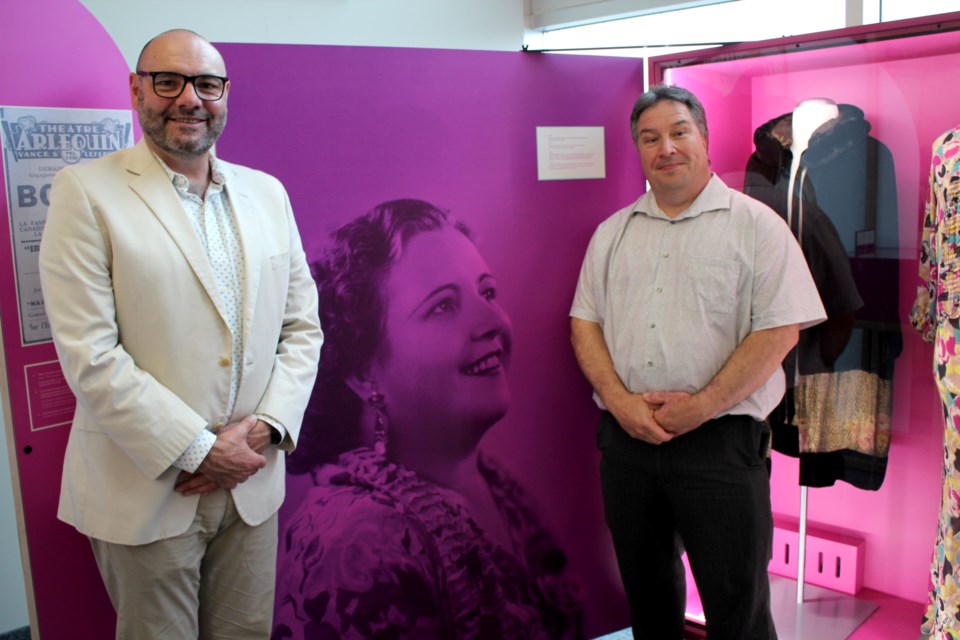Mary Travers, a depression-era Quebec folk musician, is the subject of a bilingual travelling exhibition called “Madame Bolduc on Tour,” currently on display at Collège Boréal until late fall.
You may remember the story of Travers, also known as Madame Bolduc and La Bolduc, from this Historica Canada Heritage Minute.
Originally from Gaspé and a proud ambassador of her native region, Madame Bolduc's notoriety extended throughout the province of Quebec and several French-speaking regions of Canada, and even the United States, said a press release.
Although gifted with musical talent, there were no early signs that Madame Bolduc — who was born in 1894 and died relatively young from cancer in 1941, at the age of 46 — would become one of the most popular singers of the 1930s.
Through her comical songs with evocative lyrics, combined with a contagious enthusiasm, she set herself apart from the norm and was sincerely appreciated by the audiences she played for while touring the Canadian Francophonie and the Northeastern United States.
The exhibition showcases archival documents and artifacts from these tours, including her stage costumes and jewelry, musical instruments, and letters she wrote to her children when she was away.
Particular attention was also paid to selecting objects related to the places where the exhibition will be presented, such as posters of shows that Madame Bolduc did in these cities and towns.
Vicky Boulay, curator of Musée de la Gaspésie, which originally produced the exhibition, said Madame Bolduc was known for writing songs about the daily life of ordinary people during the Depression era.
“I think it was the first time someone wrote something about the struggles of everybody,” she said. “It was the first time that a woman was going on stage and was talking about the real problems of the 1930s. So that's really why she's important in Canadian history.”
Madame Bolduc also rose to popularity throughout French-speaking Canada and the U.S. at a time when radio and records were becoming more prominent technology. “So people were starting to have some music playing in their house,” Boulay said.
One of her songs, Les moustiques, or The Mosquitoes, was written after a trip to Sudbury. Boulay said the musician had an uncle who lived in these parts.
“She wrote a song, The Mosquitoes, after coming here, because there were so many, and you should read the lyrics,” she said. “She literally said that the mosquito ate our whole face or body.”
Boulay said she and her colleagues weren’t able to find evidence that Madame Bolduc played in Sudbury, but she did play in nearby towns, including Warren and Sturgeon Falls.
She said she hopes Sudburians, especially those of younger generations, are able to “get to know” Madame Bolduc through this exhibition.
The musician had a short career of only about a decade, but she had a “big impact” on society that lasts to this day. “So I guess I just want other people to get to know her to get to know what she has done,” said Boulay.
The exhibit is being put on here in Sudbury through a collaboration between the Centre franco-ontarien de folklore and Collège Boréal.
Marc Depatie, communications director at Collège Boréal, said the college is always looking for opportunities to invite the community in, and this exhibit is just one more way to do this.
“This was an opportunity to have some artifacts, and to have a discussion about a true pioneer — a true feminist pioneer and an entrepreneurial pioneer,” he said.
“So we see in her spirit, and in her concrete actions, some of the kinds of things that we want our students to develop. And she's a great model for that.”
Patrick Breton, executive director of Centre franco-ontarien de folklore, said his organization’s goal is to keep oral Franco-Ontarian heritage alive.
While Madame Bolduc was not a Franco-Ontarian, she is a part of French-Canadian history — often referred to as the “Queen of Canadian folk singers” — so the exhibit fits well with Centre franco-ontarien de folklore’s mandate, he said.
The exhibition, which is free, can be visited Monday to Friday from 9 a.m. to 4 p.m. at Collège Boréal's Alphonse-Desjardins Resource Centre, located at 21 Lasalle Blvd. in Sudbury. It opened July 19, and runs until mid-November.
Heidi Ulrichsen is the associate content editor at Sudbury.com. She also covers education and the arts scene.
